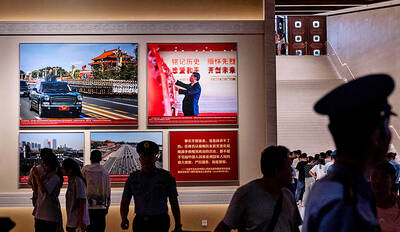Taiwanese pop star Jay Chou (周杰倫) says his appearance in the action comedy The Green Hornet fulfilled a childhood dream to imitate Bruce Lee’s (李小龍) kung fu genius and bring his musical talent to the silver screen.
The film is a reprise of the 1966-1967 television series in which Lee starred as the sidekick to masked Los Angeles crime fighter Britt Reid, a newspaper publisher who spends his nights fighting crime in a quest for vigilante justice.
It opened this month to mixed reviews, but an exceptionally strong box office. Chou’s performance was praised by some, derided by others, with many commenting on his poor command of English.
Chou and leading man Seth Rogen were in Taipei yesteday to promote the film.
“I tried hard to get this role,” Chou said. “I worship heroes. I admit I’m pretty childlike in my inner side and I like Batman and Iron Man. When I got a chance to play a hero, I told myself I couldn’t give it up.”
This is the first Hollywood film for the 32-year-old Chou, whose fame as a rap and R&B artist is mostly confined to Asia. In recent years, he has appeared in a number of Chinese-language films, one of which he also directed.
Chou said his Hornet role as Reid’s assistant Kato was not meant to mirror Lee’s one-dimensional kung fu approach, but to be “more normal and closer to reality” and provide a showcase for his musical talent.
“I hope to show Western audiences that Asians don’t just do kung fu, but also sing, write songs and play the piano,” he said. “So I put the musical element into my Kato.”
Chou said Sony Pictures has decided to make a sequel to The Green Hornet and that he is set to reappear in the same role.

Three batches of banana sauce imported from the Philippines were intercepted at the border after they were found to contain the banned industrial dye Orange G, the Food and Drug Administration (FDA) said yesterday. From today through Sept. 2 next year, all seasoning sauces from the Philippines are to be subject to the FDA’s strictest border inspection, meaning 100 percent testing for illegal dyes before entry is allowed, it said in a statement. Orange G is an industrial coloring agent that is not permitted for food use in Taiwan or internationally, said Cheng Wei-chih (鄭維智), head of the FDA’s Northern Center for

The Chinese military has built landing bridge ships designed to expand its amphibious options for a potential assault on Taiwan, but their combat effectiveness is limited due to their high vulnerability, a defense expert said in an analysis published on Monday. Shen Ming-shih (沈明室), a research fellow at the Institute for National Defense and Security Research, said that the deployment of such vessels as part of the Chinese People’s Liberation Army (PLA) Navy’s East Sea Fleet signals a strong focus on Taiwan. However, the ships are highly vulnerable to precision strikes, which means they could be destroyed before they achieve their intended

About 4.2 million tourist arrivals were recorded in the first half of this year, a 10 percent increase from the same period last year, the Tourism Administration said yesterday. The growth continues to be consistent, with the fourth quarter of this year expected to be the peak in Taiwan, the agency said, adding that it plans to promote Taiwan overseas via partnerships and major events. From January to June, 9.14 million international departures were recorded from Taiwan, an 11 percent increase from the same period last year, with 3.3 million headed for Japan, 1.52 million for China and 832,962 to South Korea,

REWRITING HISTORY: China has been advocating a ‘correct’ interpretation of the victory over Japan that brings the CCP’s contributions to the forefront, an expert said An elderly Chinese war veteran’s shin still bears the mark of a bullet wound he sustained when fighting the Japanese as a teenager, a year before the end of World War II. Eighty years on, Li Jinshui’s scar remains as testimony to the bravery of Chinese troops in a conflict that killed millions of their people. However, the story behind China’s overthrow of the brutal Japanese occupation is deeply contested. Historians broadly agree that credit for victory lies primarily with the Chinese Nationalist Party (KMT)-led Republic of China (ROC) Army. Its leader, Chiang Kai-shek (蔣介石), fled to Taiwan in 1949 after losing a